PND & African-Caribbean Women in the UK: A Systematic Review
VerifiedAdded on 2023/06/15
|15
|3737
|386
Report
AI Summary
This report presents a systematic review of literature focusing on postnatal depression (PND) among African-Caribbean women in the UK. It identifies key factors impacting the effectiveness of PND intervention and treatment within these communities, including a lack of understanding of PND as a mental health issue, insufficient cultural and clinical competency among care professionals, social identity and self-construct of African-Caribbean women, social exclusion, fear of engaging with mental health services, and the stigma surrounding mental health. The review highlights the importance of early screening and support for mothers at high risk of PND through antenatal classes, postnatal debriefing, CBT, postnatal checkups, midwife services, social support, home support, and psychotherapy. The report recommends further improvements to ensure equal service provision, particularly in developing cultural and clinical competencies for care professionals to better address this health problem.
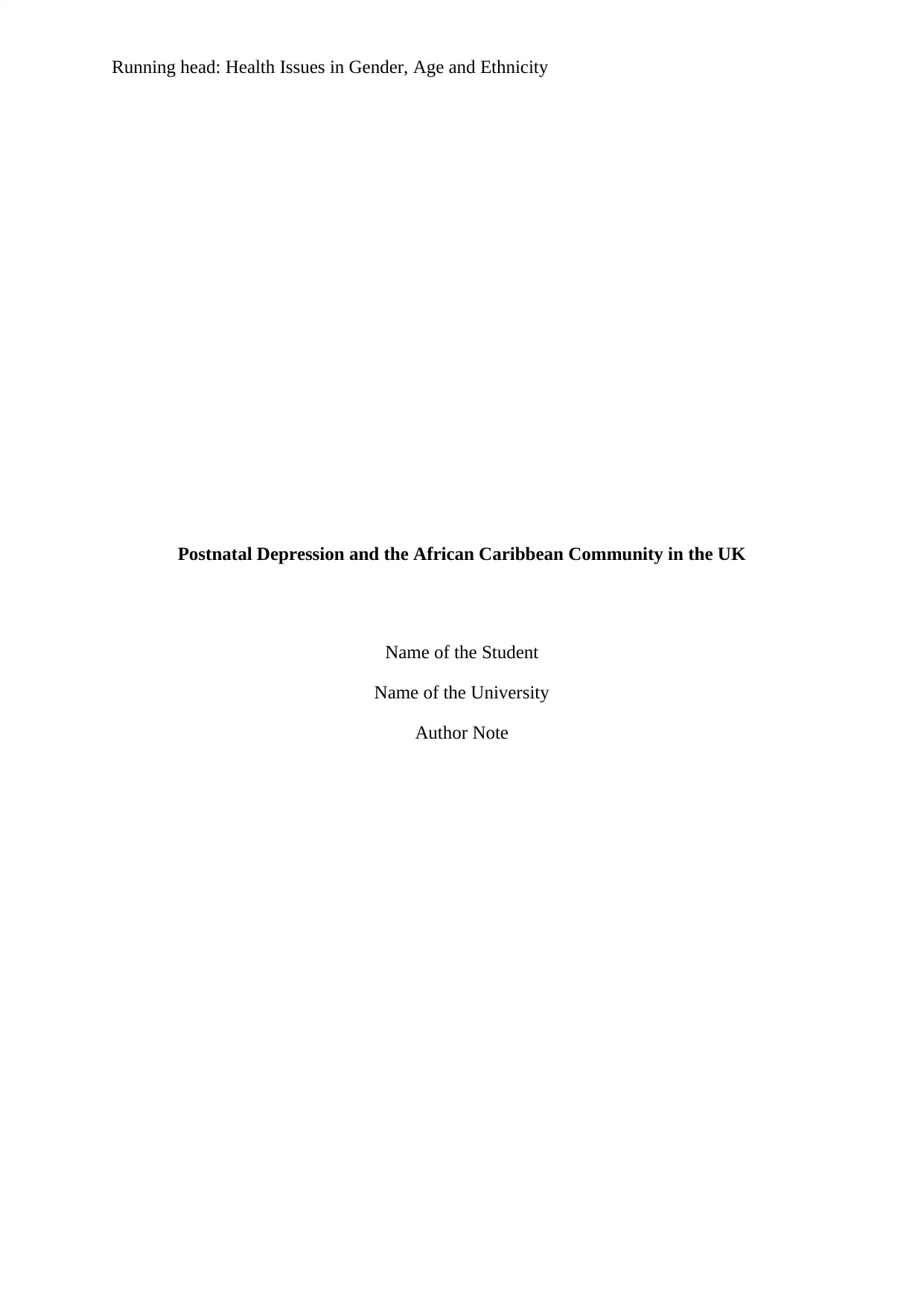
Running head: Health Issues in Gender, Age and Ethnicity
Postnatal Depression and the African Caribbean Community in the UK
Name of the Student
Name of the University
Author Note
Postnatal Depression and the African Caribbean Community in the UK
Name of the Student
Name of the University
Author Note
Paraphrase This Document
Need a fresh take? Get an instant paraphrase of this document with our AI Paraphraser
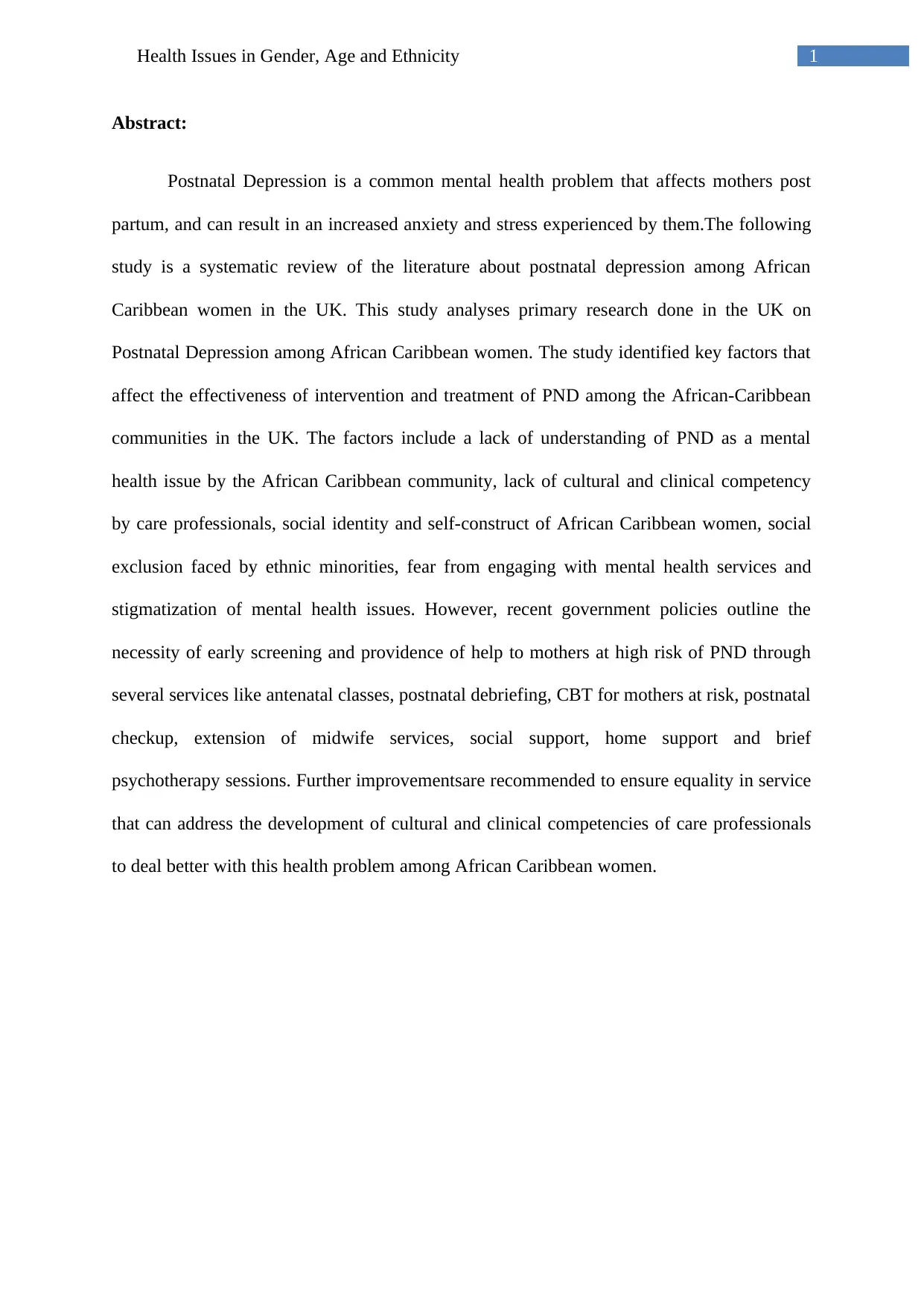
1Health Issues in Gender, Age and Ethnicity
Abstract:
Postnatal Depression is a common mental health problem that affects mothers post
partum, and can result in an increased anxiety and stress experienced by them.The following
study is a systematic review of the literature about postnatal depression among African
Caribbean women in the UK. This study analyses primary research done in the UK on
Postnatal Depression among African Caribbean women. The study identified key factors that
affect the effectiveness of intervention and treatment of PND among the African-Caribbean
communities in the UK. The factors include a lack of understanding of PND as a mental
health issue by the African Caribbean community, lack of cultural and clinical competency
by care professionals, social identity and self-construct of African Caribbean women, social
exclusion faced by ethnic minorities, fear from engaging with mental health services and
stigmatization of mental health issues. However, recent government policies outline the
necessity of early screening and providence of help to mothers at high risk of PND through
several services like antenatal classes, postnatal debriefing, CBT for mothers at risk, postnatal
checkup, extension of midwife services, social support, home support and brief
psychotherapy sessions. Further improvementsare recommended to ensure equality in service
that can address the development of cultural and clinical competencies of care professionals
to deal better with this health problem among African Caribbean women.
Abstract:
Postnatal Depression is a common mental health problem that affects mothers post
partum, and can result in an increased anxiety and stress experienced by them.The following
study is a systematic review of the literature about postnatal depression among African
Caribbean women in the UK. This study analyses primary research done in the UK on
Postnatal Depression among African Caribbean women. The study identified key factors that
affect the effectiveness of intervention and treatment of PND among the African-Caribbean
communities in the UK. The factors include a lack of understanding of PND as a mental
health issue by the African Caribbean community, lack of cultural and clinical competency
by care professionals, social identity and self-construct of African Caribbean women, social
exclusion faced by ethnic minorities, fear from engaging with mental health services and
stigmatization of mental health issues. However, recent government policies outline the
necessity of early screening and providence of help to mothers at high risk of PND through
several services like antenatal classes, postnatal debriefing, CBT for mothers at risk, postnatal
checkup, extension of midwife services, social support, home support and brief
psychotherapy sessions. Further improvementsare recommended to ensure equality in service
that can address the development of cultural and clinical competencies of care professionals
to deal better with this health problem among African Caribbean women.
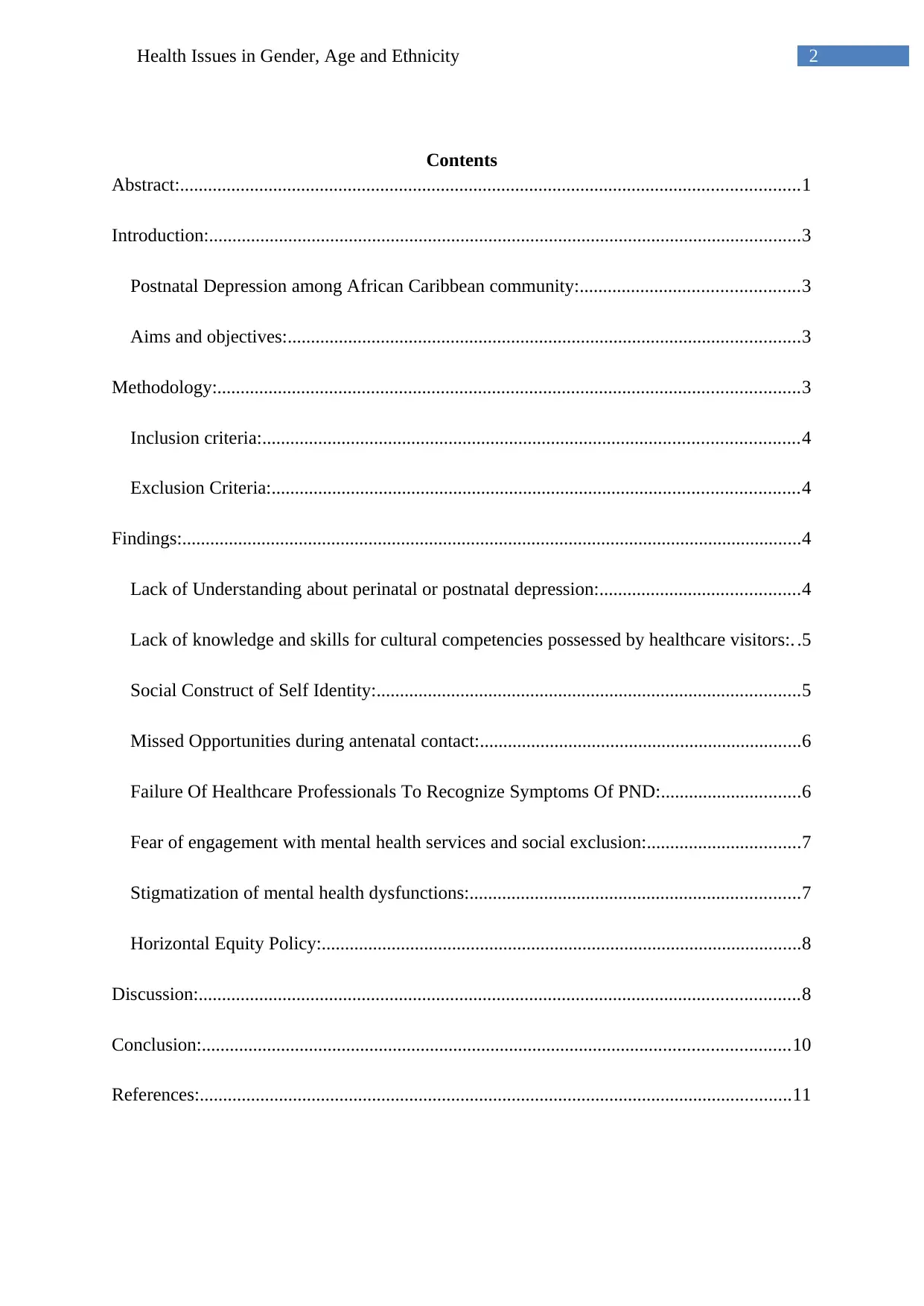
2Health Issues in Gender, Age and Ethnicity
Contents
Abstract:.....................................................................................................................................1
Introduction:...............................................................................................................................3
Postnatal Depression among African Caribbean community:...............................................3
Aims and objectives:..............................................................................................................3
Methodology:.............................................................................................................................3
Inclusion criteria:...................................................................................................................4
Exclusion Criteria:.................................................................................................................4
Findings:.....................................................................................................................................4
Lack of Understanding about perinatal or postnatal depression:...........................................4
Lack of knowledge and skills for cultural competencies possessed by healthcare visitors:. .5
Social Construct of Self Identity:...........................................................................................5
Missed Opportunities during antenatal contact:.....................................................................6
Failure Of Healthcare Professionals To Recognize Symptoms Of PND:..............................6
Fear of engagement with mental health services and social exclusion:.................................7
Stigmatization of mental health dysfunctions:.......................................................................7
Horizontal Equity Policy:.......................................................................................................8
Discussion:.................................................................................................................................8
Conclusion:..............................................................................................................................10
References:...............................................................................................................................11
Contents
Abstract:.....................................................................................................................................1
Introduction:...............................................................................................................................3
Postnatal Depression among African Caribbean community:...............................................3
Aims and objectives:..............................................................................................................3
Methodology:.............................................................................................................................3
Inclusion criteria:...................................................................................................................4
Exclusion Criteria:.................................................................................................................4
Findings:.....................................................................................................................................4
Lack of Understanding about perinatal or postnatal depression:...........................................4
Lack of knowledge and skills for cultural competencies possessed by healthcare visitors:. .5
Social Construct of Self Identity:...........................................................................................5
Missed Opportunities during antenatal contact:.....................................................................6
Failure Of Healthcare Professionals To Recognize Symptoms Of PND:..............................6
Fear of engagement with mental health services and social exclusion:.................................7
Stigmatization of mental health dysfunctions:.......................................................................7
Horizontal Equity Policy:.......................................................................................................8
Discussion:.................................................................................................................................8
Conclusion:..............................................................................................................................10
References:...............................................................................................................................11
⊘ This is a preview!⊘
Do you want full access?
Subscribe today to unlock all pages.

Trusted by 1+ million students worldwide

3Health Issues in Gender, Age and Ethnicity
Paraphrase This Document
Need a fresh take? Get an instant paraphrase of this document with our AI Paraphraser
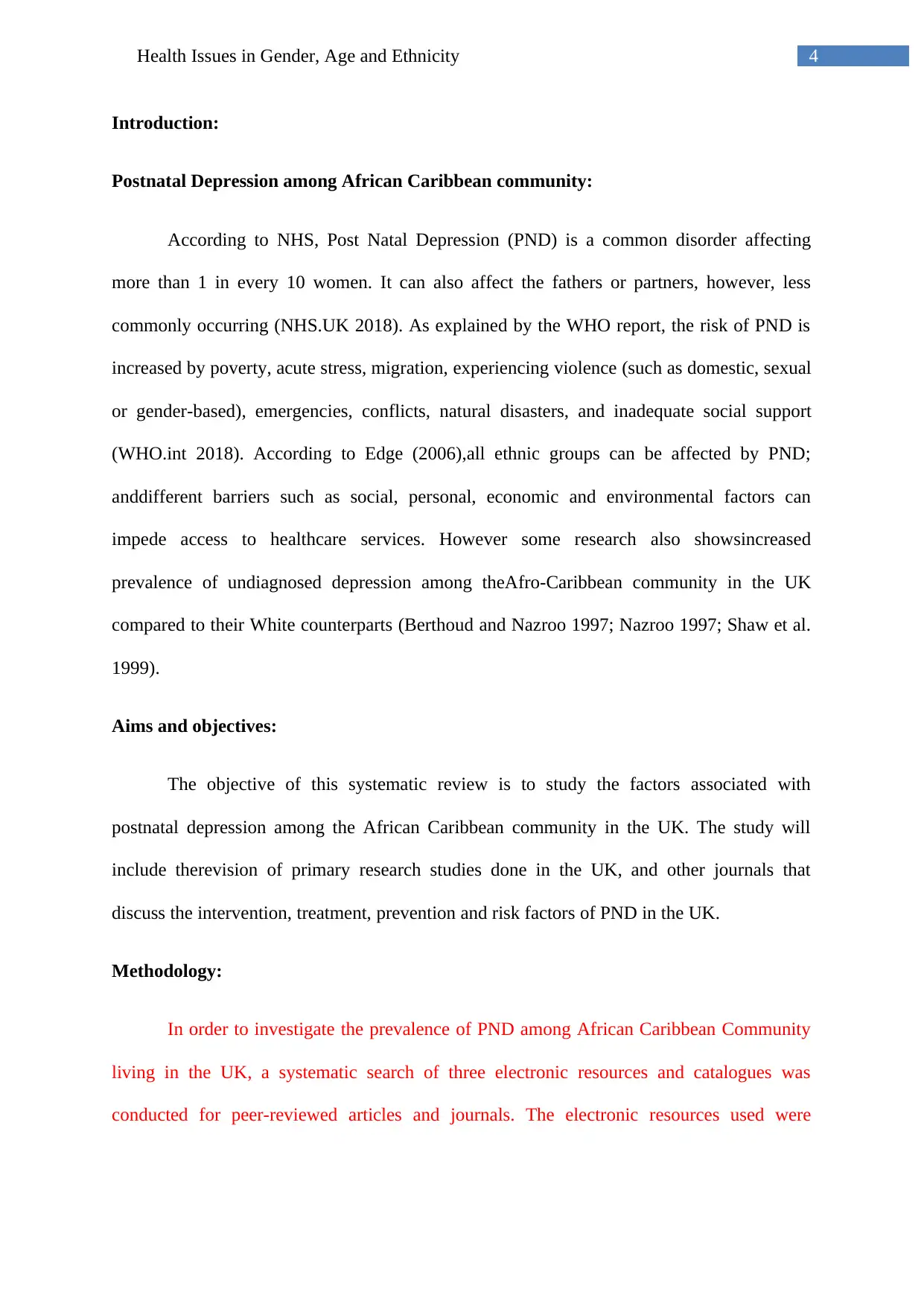
4Health Issues in Gender, Age and Ethnicity
Introduction:
Postnatal Depression among African Caribbean community:
According to NHS, Post Natal Depression (PND) is a common disorder affecting
more than 1 in every 10 women. It can also affect the fathers or partners, however, less
commonly occurring (NHS.UK 2018). As explained by the WHO report, the risk of PND is
increased by poverty, acute stress, migration, experiencing violence (such as domestic, sexual
or gender-based), emergencies, conflicts, natural disasters, and inadequate social support
(WHO.int 2018). According to Edge (2006),all ethnic groups can be affected by PND;
anddifferent barriers such as social, personal, economic and environmental factors can
impede access to healthcare services. However some research also showsincreased
prevalence of undiagnosed depression among theAfro-Caribbean community in the UK
compared to their White counterparts (Berthoud and Nazroo 1997; Nazroo 1997; Shaw et al.
1999).
Aims and objectives:
The objective of this systematic review is to study the factors associated with
postnatal depression among the African Caribbean community in the UK. The study will
include therevision of primary research studies done in the UK, and other journals that
discuss the intervention, treatment, prevention and risk factors of PND in the UK.
Methodology:
In order to investigate the prevalence of PND among African Caribbean Community
living in the UK, a systematic search of three electronic resources and catalogues was
conducted for peer-reviewed articles and journals. The electronic resources used were
Introduction:
Postnatal Depression among African Caribbean community:
According to NHS, Post Natal Depression (PND) is a common disorder affecting
more than 1 in every 10 women. It can also affect the fathers or partners, however, less
commonly occurring (NHS.UK 2018). As explained by the WHO report, the risk of PND is
increased by poverty, acute stress, migration, experiencing violence (such as domestic, sexual
or gender-based), emergencies, conflicts, natural disasters, and inadequate social support
(WHO.int 2018). According to Edge (2006),all ethnic groups can be affected by PND;
anddifferent barriers such as social, personal, economic and environmental factors can
impede access to healthcare services. However some research also showsincreased
prevalence of undiagnosed depression among theAfro-Caribbean community in the UK
compared to their White counterparts (Berthoud and Nazroo 1997; Nazroo 1997; Shaw et al.
1999).
Aims and objectives:
The objective of this systematic review is to study the factors associated with
postnatal depression among the African Caribbean community in the UK. The study will
include therevision of primary research studies done in the UK, and other journals that
discuss the intervention, treatment, prevention and risk factors of PND in the UK.
Methodology:
In order to investigate the prevalence of PND among African Caribbean Community
living in the UK, a systematic search of three electronic resources and catalogues was
conducted for peer-reviewed articles and journals. The electronic resources used were
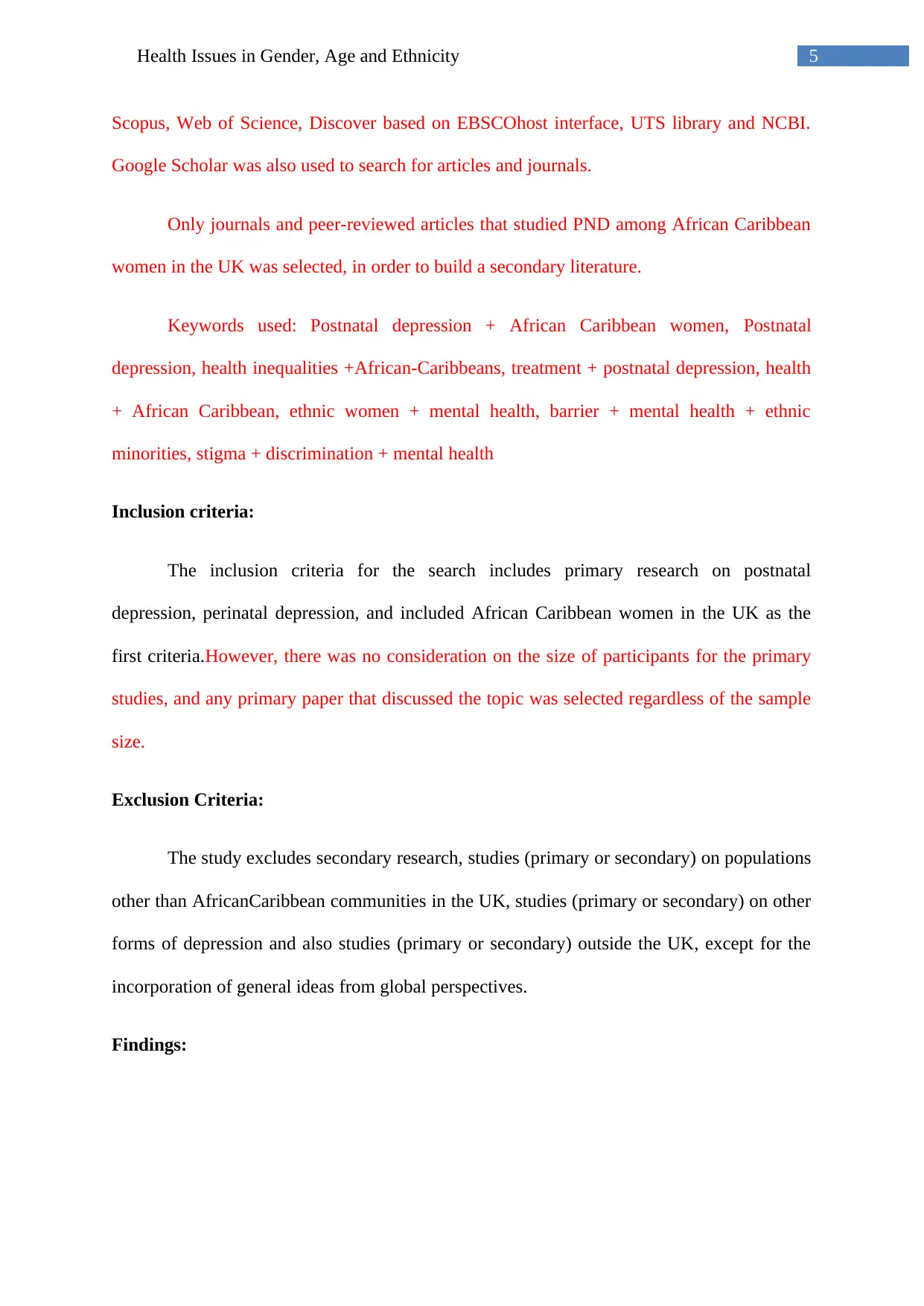
5Health Issues in Gender, Age and Ethnicity
Scopus, Web of Science, Discover based on EBSCOhost interface, UTS library and NCBI.
Google Scholar was also used to search for articles and journals.
Only journals and peer-reviewed articles that studied PND among African Caribbean
women in the UK was selected, in order to build a secondary literature.
Keywords used: Postnatal depression + African Caribbean women, Postnatal
depression, health inequalities +African-Caribbeans, treatment + postnatal depression, health
+ African Caribbean, ethnic women + mental health, barrier + mental health + ethnic
minorities, stigma + discrimination + mental health
Inclusion criteria:
The inclusion criteria for the search includes primary research on postnatal
depression, perinatal depression, and included African Caribbean women in the UK as the
first criteria.However, there was no consideration on the size of participants for the primary
studies, and any primary paper that discussed the topic was selected regardless of the sample
size.
Exclusion Criteria:
The study excludes secondary research, studies (primary or secondary) on populations
other than AfricanCaribbean communities in the UK, studies (primary or secondary) on other
forms of depression and also studies (primary or secondary) outside the UK, except for the
incorporation of general ideas from global perspectives.
Findings:
Scopus, Web of Science, Discover based on EBSCOhost interface, UTS library and NCBI.
Google Scholar was also used to search for articles and journals.
Only journals and peer-reviewed articles that studied PND among African Caribbean
women in the UK was selected, in order to build a secondary literature.
Keywords used: Postnatal depression + African Caribbean women, Postnatal
depression, health inequalities +African-Caribbeans, treatment + postnatal depression, health
+ African Caribbean, ethnic women + mental health, barrier + mental health + ethnic
minorities, stigma + discrimination + mental health
Inclusion criteria:
The inclusion criteria for the search includes primary research on postnatal
depression, perinatal depression, and included African Caribbean women in the UK as the
first criteria.However, there was no consideration on the size of participants for the primary
studies, and any primary paper that discussed the topic was selected regardless of the sample
size.
Exclusion Criteria:
The study excludes secondary research, studies (primary or secondary) on populations
other than AfricanCaribbean communities in the UK, studies (primary or secondary) on other
forms of depression and also studies (primary or secondary) outside the UK, except for the
incorporation of general ideas from global perspectives.
Findings:
⊘ This is a preview!⊘
Do you want full access?
Subscribe today to unlock all pages.

Trusted by 1+ million students worldwide
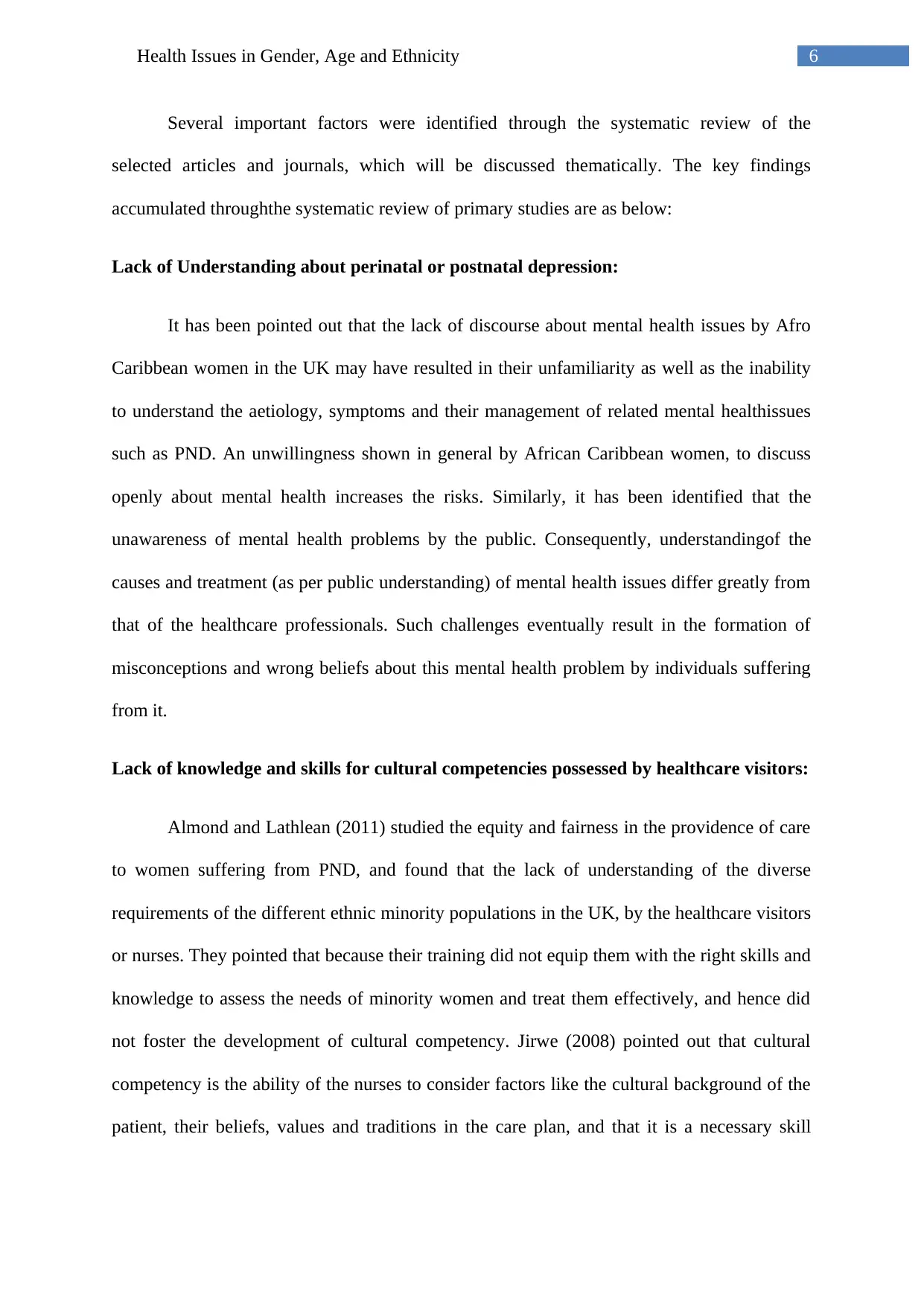
6Health Issues in Gender, Age and Ethnicity
Several important factors were identified through the systematic review of the
selected articles and journals, which will be discussed thematically. The key findings
accumulated throughthe systematic review of primary studies are as below:
Lack of Understanding about perinatal or postnatal depression:
It has been pointed out that the lack of discourse about mental health issues by Afro
Caribbean women in the UK may have resulted in their unfamiliarity as well as the inability
to understand the aetiology, symptoms and their management of related mental healthissues
such as PND. An unwillingness shown in general by African Caribbean women, to discuss
openly about mental health increases the risks. Similarly, it has been identified that the
unawareness of mental health problems by the public. Consequently, understandingof the
causes and treatment (as per public understanding) of mental health issues differ greatly from
that of the healthcare professionals. Such challenges eventually result in the formation of
misconceptions and wrong beliefs about this mental health problem by individuals suffering
from it.
Lack of knowledge and skills for cultural competencies possessed by healthcare visitors:
Almond and Lathlean (2011) studied the equity and fairness in the providence of care
to women suffering from PND, and found that the lack of understanding of the diverse
requirements of the different ethnic minority populations in the UK, by the healthcare visitors
or nurses. They pointed that because their training did not equip them with the right skills and
knowledge to assess the needs of minority women and treat them effectively, and hence did
not foster the development of cultural competency. Jirwe (2008) pointed out that cultural
competency is the ability of the nurses to consider factors like the cultural background of the
patient, their beliefs, values and traditions in the care plan, and that it is a necessary skill
Several important factors were identified through the systematic review of the
selected articles and journals, which will be discussed thematically. The key findings
accumulated throughthe systematic review of primary studies are as below:
Lack of Understanding about perinatal or postnatal depression:
It has been pointed out that the lack of discourse about mental health issues by Afro
Caribbean women in the UK may have resulted in their unfamiliarity as well as the inability
to understand the aetiology, symptoms and their management of related mental healthissues
such as PND. An unwillingness shown in general by African Caribbean women, to discuss
openly about mental health increases the risks. Similarly, it has been identified that the
unawareness of mental health problems by the public. Consequently, understandingof the
causes and treatment (as per public understanding) of mental health issues differ greatly from
that of the healthcare professionals. Such challenges eventually result in the formation of
misconceptions and wrong beliefs about this mental health problem by individuals suffering
from it.
Lack of knowledge and skills for cultural competencies possessed by healthcare visitors:
Almond and Lathlean (2011) studied the equity and fairness in the providence of care
to women suffering from PND, and found that the lack of understanding of the diverse
requirements of the different ethnic minority populations in the UK, by the healthcare visitors
or nurses. They pointed that because their training did not equip them with the right skills and
knowledge to assess the needs of minority women and treat them effectively, and hence did
not foster the development of cultural competency. Jirwe (2008) pointed out that cultural
competency is the ability of the nurses to consider factors like the cultural background of the
patient, their beliefs, values and traditions in the care plan, and that it is a necessary skill
Paraphrase This Document
Need a fresh take? Get an instant paraphrase of this document with our AI Paraphraser
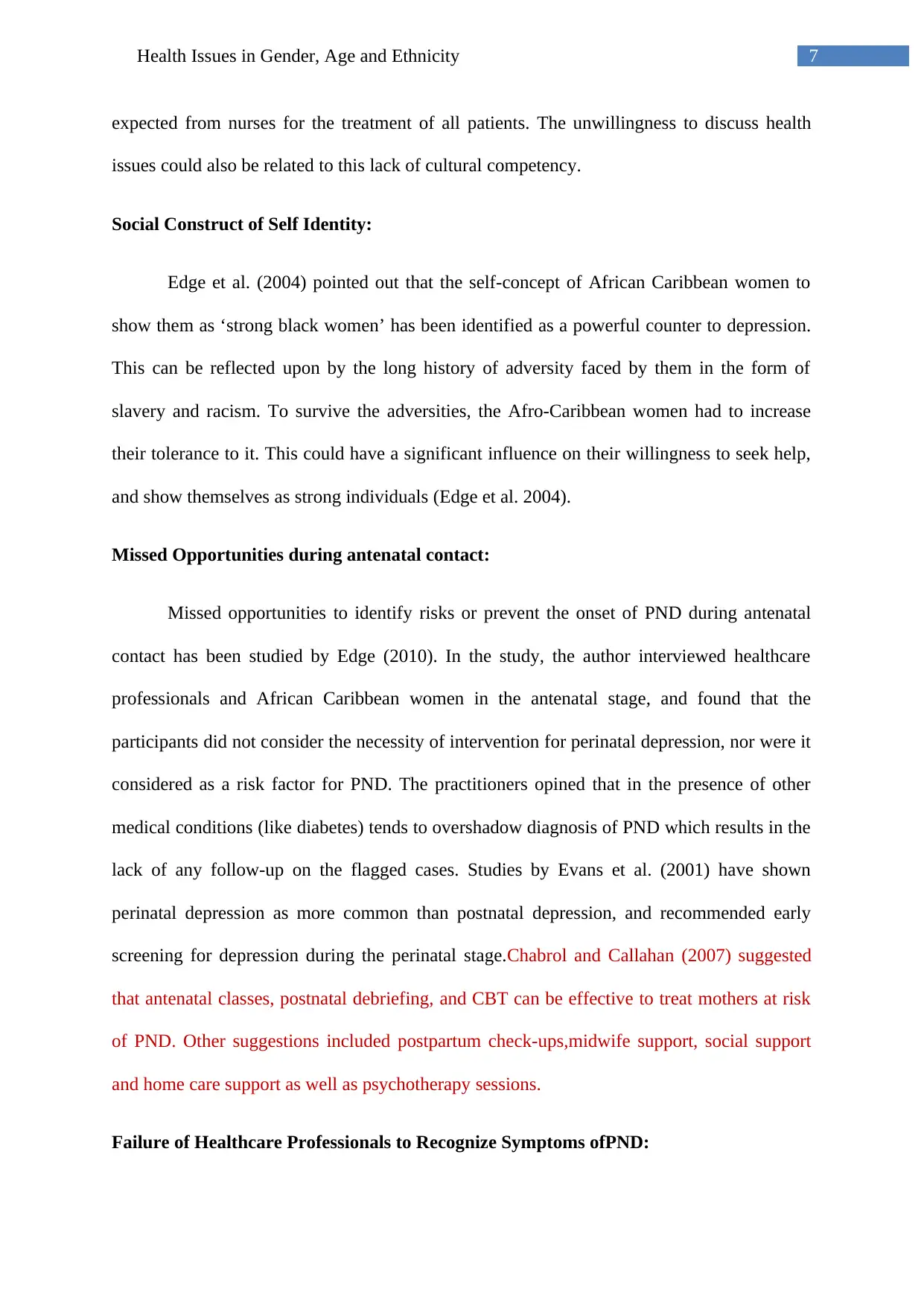
7Health Issues in Gender, Age and Ethnicity
expected from nurses for the treatment of all patients. The unwillingness to discuss health
issues could also be related to this lack of cultural competency.
Social Construct of Self Identity:
Edge et al. (2004) pointed out that the self-concept of African Caribbean women to
show them as ‘strong black women’ has been identified as a powerful counter to depression.
This can be reflected upon by the long history of adversity faced by them in the form of
slavery and racism. To survive the adversities, the Afro-Caribbean women had to increase
their tolerance to it. This could have a significant influence on their willingness to seek help,
and show themselves as strong individuals (Edge et al. 2004).
Missed Opportunities during antenatal contact:
Missed opportunities to identify risks or prevent the onset of PND during antenatal
contact has been studied by Edge (2010). In the study, the author interviewed healthcare
professionals and African Caribbean women in the antenatal stage, and found that the
participants did not consider the necessity of intervention for perinatal depression, nor were it
considered as a risk factor for PND. The practitioners opined that in the presence of other
medical conditions (like diabetes) tends to overshadow diagnosis of PND which results in the
lack of any follow-up on the flagged cases. Studies by Evans et al. (2001) have shown
perinatal depression as more common than postnatal depression, and recommended early
screening for depression during the perinatal stage.Chabrol and Callahan (2007) suggested
that antenatal classes, postnatal debriefing, and CBT can be effective to treat mothers at risk
of PND. Other suggestions included postpartum check-ups,midwife support, social support
and home care support as well as psychotherapy sessions.
Failure of Healthcare Professionals to Recognize Symptoms ofPND:
expected from nurses for the treatment of all patients. The unwillingness to discuss health
issues could also be related to this lack of cultural competency.
Social Construct of Self Identity:
Edge et al. (2004) pointed out that the self-concept of African Caribbean women to
show them as ‘strong black women’ has been identified as a powerful counter to depression.
This can be reflected upon by the long history of adversity faced by them in the form of
slavery and racism. To survive the adversities, the Afro-Caribbean women had to increase
their tolerance to it. This could have a significant influence on their willingness to seek help,
and show themselves as strong individuals (Edge et al. 2004).
Missed Opportunities during antenatal contact:
Missed opportunities to identify risks or prevent the onset of PND during antenatal
contact has been studied by Edge (2010). In the study, the author interviewed healthcare
professionals and African Caribbean women in the antenatal stage, and found that the
participants did not consider the necessity of intervention for perinatal depression, nor were it
considered as a risk factor for PND. The practitioners opined that in the presence of other
medical conditions (like diabetes) tends to overshadow diagnosis of PND which results in the
lack of any follow-up on the flagged cases. Studies by Evans et al. (2001) have shown
perinatal depression as more common than postnatal depression, and recommended early
screening for depression during the perinatal stage.Chabrol and Callahan (2007) suggested
that antenatal classes, postnatal debriefing, and CBT can be effective to treat mothers at risk
of PND. Other suggestions included postpartum check-ups,midwife support, social support
and home care support as well as psychotherapy sessions.
Failure of Healthcare Professionals to Recognize Symptoms ofPND:
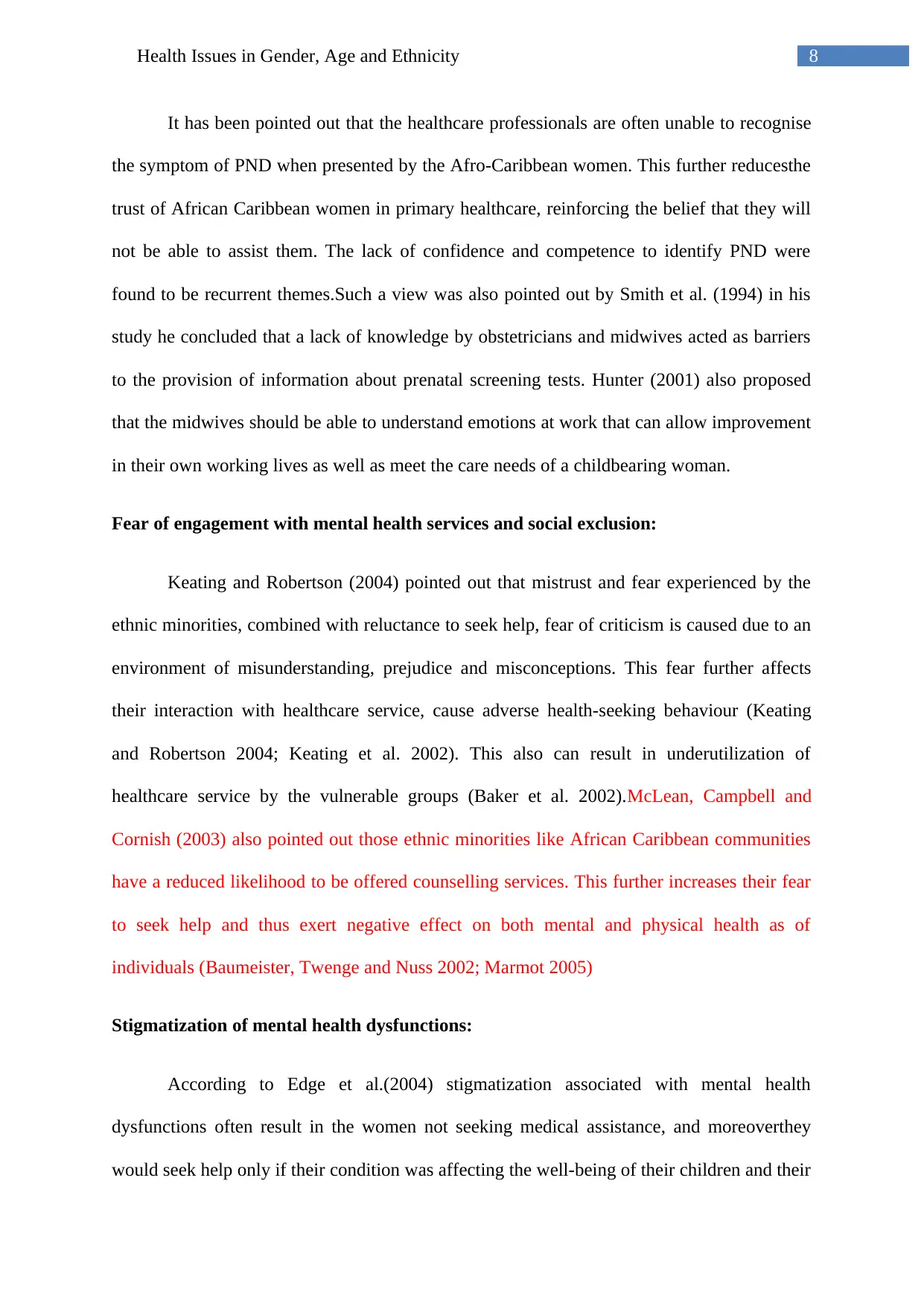
8Health Issues in Gender, Age and Ethnicity
It has been pointed out that the healthcare professionals are often unable to recognise
the symptom of PND when presented by the Afro-Caribbean women. This further reducesthe
trust of African Caribbean women in primary healthcare, reinforcing the belief that they will
not be able to assist them. The lack of confidence and competence to identify PND were
found to be recurrent themes.Such a view was also pointed out by Smith et al. (1994) in his
study he concluded that a lack of knowledge by obstetricians and midwives acted as barriers
to the provision of information about prenatal screening tests. Hunter (2001) also proposed
that the midwives should be able to understand emotions at work that can allow improvement
in their own working lives as well as meet the care needs of a childbearing woman.
Fear of engagement with mental health services and social exclusion:
Keating and Robertson (2004) pointed out that mistrust and fear experienced by the
ethnic minorities, combined with reluctance to seek help, fear of criticism is caused due to an
environment of misunderstanding, prejudice and misconceptions. This fear further affects
their interaction with healthcare service, cause adverse health-seeking behaviour (Keating
and Robertson 2004; Keating et al. 2002). This also can result in underutilization of
healthcare service by the vulnerable groups (Baker et al. 2002).McLean, Campbell and
Cornish (2003) also pointed out those ethnic minorities like African Caribbean communities
have a reduced likelihood to be offered counselling services. This further increases their fear
to seek help and thus exert negative effect on both mental and physical health as of
individuals (Baumeister, Twenge and Nuss 2002; Marmot 2005)
Stigmatization of mental health dysfunctions:
According to Edge et al.(2004) stigmatization associated with mental health
dysfunctions often result in the women not seeking medical assistance, and moreoverthey
would seek help only if their condition was affecting the well-being of their children and their
It has been pointed out that the healthcare professionals are often unable to recognise
the symptom of PND when presented by the Afro-Caribbean women. This further reducesthe
trust of African Caribbean women in primary healthcare, reinforcing the belief that they will
not be able to assist them. The lack of confidence and competence to identify PND were
found to be recurrent themes.Such a view was also pointed out by Smith et al. (1994) in his
study he concluded that a lack of knowledge by obstetricians and midwives acted as barriers
to the provision of information about prenatal screening tests. Hunter (2001) also proposed
that the midwives should be able to understand emotions at work that can allow improvement
in their own working lives as well as meet the care needs of a childbearing woman.
Fear of engagement with mental health services and social exclusion:
Keating and Robertson (2004) pointed out that mistrust and fear experienced by the
ethnic minorities, combined with reluctance to seek help, fear of criticism is caused due to an
environment of misunderstanding, prejudice and misconceptions. This fear further affects
their interaction with healthcare service, cause adverse health-seeking behaviour (Keating
and Robertson 2004; Keating et al. 2002). This also can result in underutilization of
healthcare service by the vulnerable groups (Baker et al. 2002).McLean, Campbell and
Cornish (2003) also pointed out those ethnic minorities like African Caribbean communities
have a reduced likelihood to be offered counselling services. This further increases their fear
to seek help and thus exert negative effect on both mental and physical health as of
individuals (Baumeister, Twenge and Nuss 2002; Marmot 2005)
Stigmatization of mental health dysfunctions:
According to Edge et al.(2004) stigmatization associated with mental health
dysfunctions often result in the women not seeking medical assistance, and moreoverthey
would seek help only if their condition was affecting the well-being of their children and their
⊘ This is a preview!⊘
Do you want full access?
Subscribe today to unlock all pages.

Trusted by 1+ million students worldwide
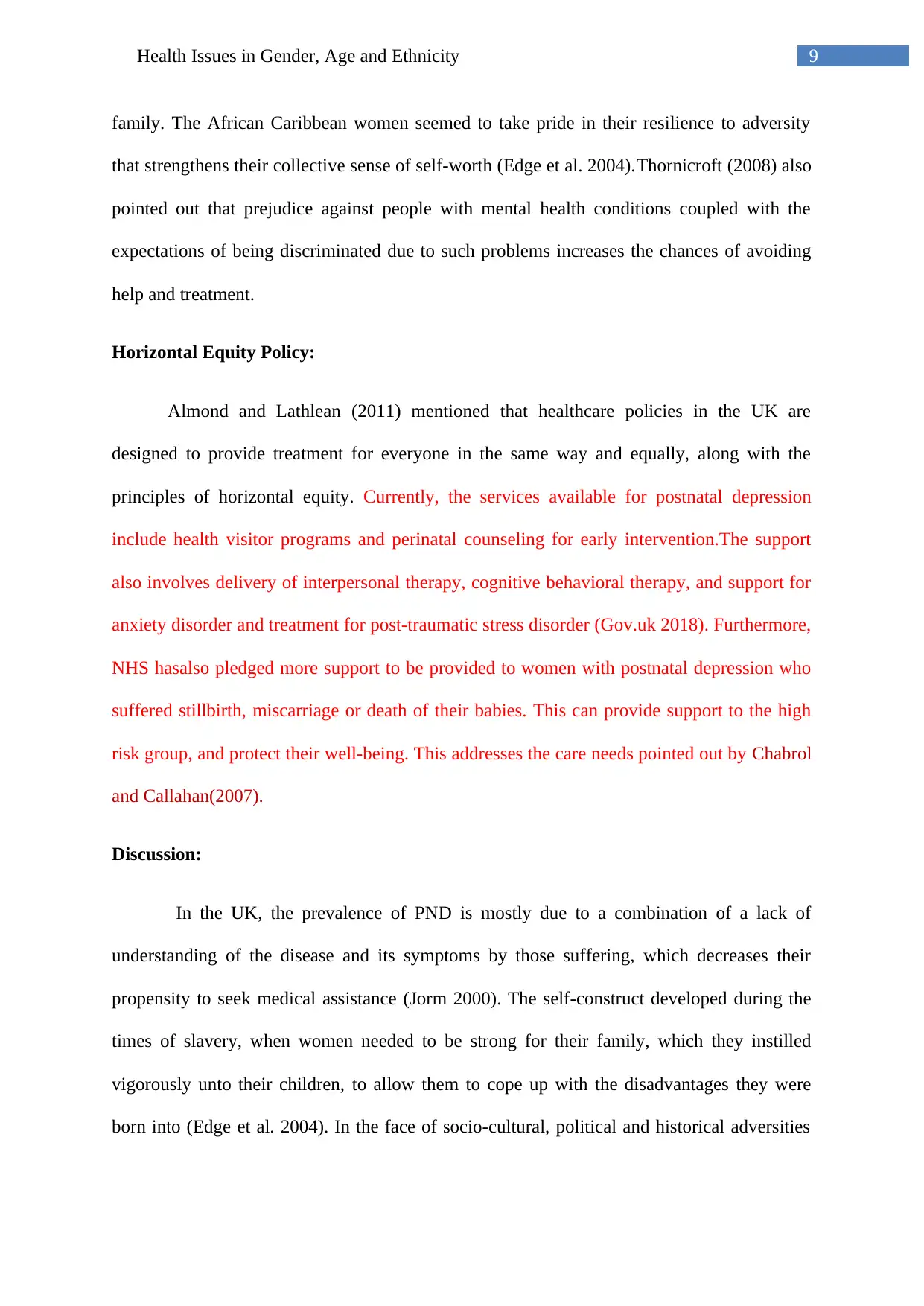
9Health Issues in Gender, Age and Ethnicity
family. The African Caribbean women seemed to take pride in their resilience to adversity
that strengthens their collective sense of self-worth (Edge et al. 2004).Thornicroft (2008) also
pointed out that prejudice against people with mental health conditions coupled with the
expectations of being discriminated due to such problems increases the chances of avoiding
help and treatment.
Horizontal Equity Policy:
Almond and Lathlean (2011) mentioned that healthcare policies in the UK are
designed to provide treatment for everyone in the same way and equally, along with the
principles of horizontal equity. Currently, the services available for postnatal depression
include health visitor programs and perinatal counseling for early intervention.The support
also involves delivery of interpersonal therapy, cognitive behavioral therapy, and support for
anxiety disorder and treatment for post-traumatic stress disorder (Gov.uk 2018). Furthermore,
NHS hasalso pledged more support to be provided to women with postnatal depression who
suffered stillbirth, miscarriage or death of their babies. This can provide support to the high
risk group, and protect their well-being. This addresses the care needs pointed out by Chabrol
and Callahan(2007).
Discussion:
In the UK, the prevalence of PND is mostly due to a combination of a lack of
understanding of the disease and its symptoms by those suffering, which decreases their
propensity to seek medical assistance (Jorm 2000). The self-construct developed during the
times of slavery, when women needed to be strong for their family, which they instilled
vigorously unto their children, to allow them to cope up with the disadvantages they were
born into (Edge et al. 2004). In the face of socio-cultural, political and historical adversities
family. The African Caribbean women seemed to take pride in their resilience to adversity
that strengthens their collective sense of self-worth (Edge et al. 2004).Thornicroft (2008) also
pointed out that prejudice against people with mental health conditions coupled with the
expectations of being discriminated due to such problems increases the chances of avoiding
help and treatment.
Horizontal Equity Policy:
Almond and Lathlean (2011) mentioned that healthcare policies in the UK are
designed to provide treatment for everyone in the same way and equally, along with the
principles of horizontal equity. Currently, the services available for postnatal depression
include health visitor programs and perinatal counseling for early intervention.The support
also involves delivery of interpersonal therapy, cognitive behavioral therapy, and support for
anxiety disorder and treatment for post-traumatic stress disorder (Gov.uk 2018). Furthermore,
NHS hasalso pledged more support to be provided to women with postnatal depression who
suffered stillbirth, miscarriage or death of their babies. This can provide support to the high
risk group, and protect their well-being. This addresses the care needs pointed out by Chabrol
and Callahan(2007).
Discussion:
In the UK, the prevalence of PND is mostly due to a combination of a lack of
understanding of the disease and its symptoms by those suffering, which decreases their
propensity to seek medical assistance (Jorm 2000). The self-construct developed during the
times of slavery, when women needed to be strong for their family, which they instilled
vigorously unto their children, to allow them to cope up with the disadvantages they were
born into (Edge et al. 2004). In the face of socio-cultural, political and historical adversities
Paraphrase This Document
Need a fresh take? Get an instant paraphrase of this document with our AI Paraphraser
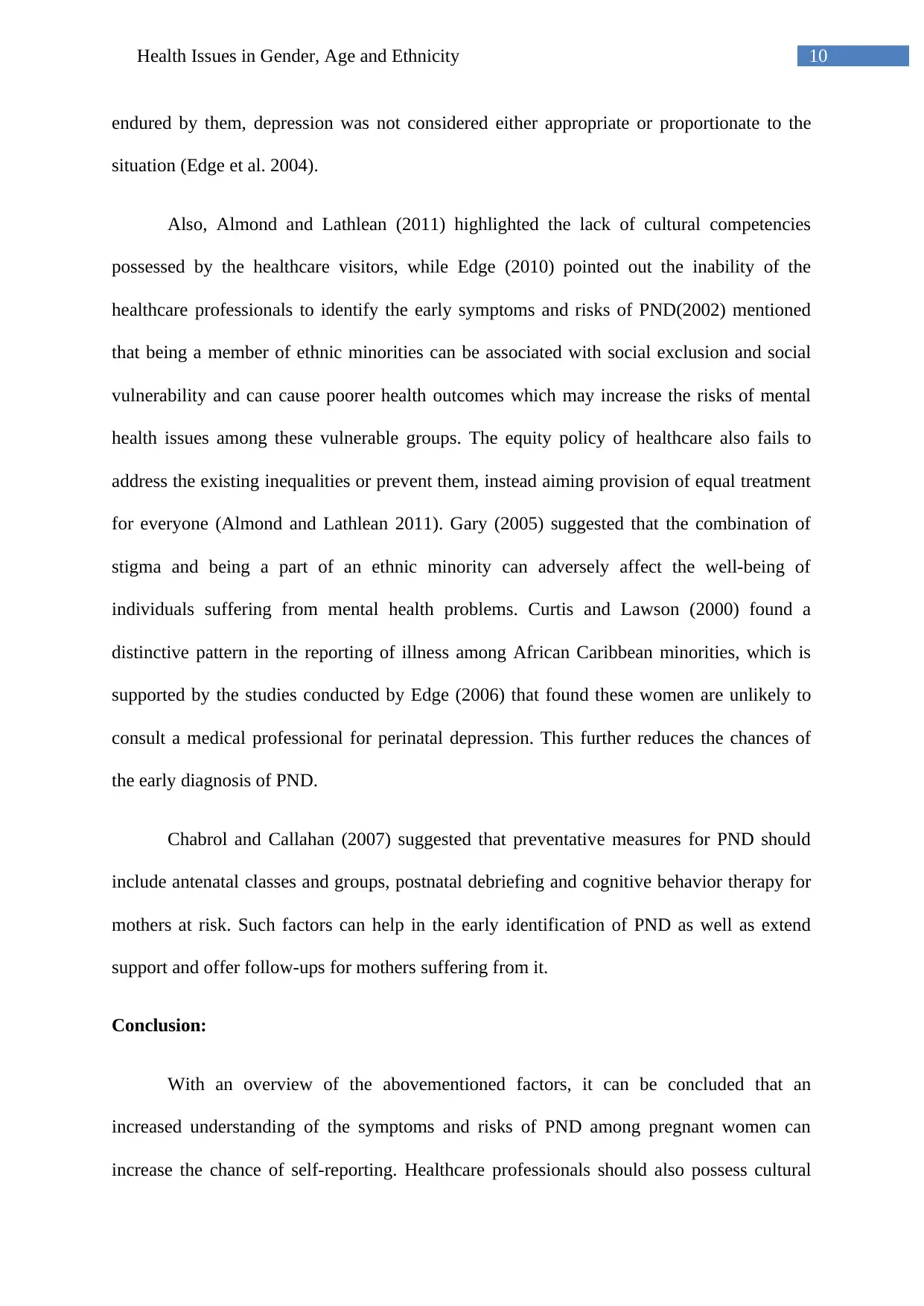
10Health Issues in Gender, Age and Ethnicity
endured by them, depression was not considered either appropriate or proportionate to the
situation (Edge et al. 2004).
Also, Almond and Lathlean (2011) highlighted the lack of cultural competencies
possessed by the healthcare visitors, while Edge (2010) pointed out the inability of the
healthcare professionals to identify the early symptoms and risks of PND(2002) mentioned
that being a member of ethnic minorities can be associated with social exclusion and social
vulnerability and can cause poorer health outcomes which may increase the risks of mental
health issues among these vulnerable groups. The equity policy of healthcare also fails to
address the existing inequalities or prevent them, instead aiming provision of equal treatment
for everyone (Almond and Lathlean 2011). Gary (2005) suggested that the combination of
stigma and being a part of an ethnic minority can adversely affect the well-being of
individuals suffering from mental health problems. Curtis and Lawson (2000) found a
distinctive pattern in the reporting of illness among African Caribbean minorities, which is
supported by the studies conducted by Edge (2006) that found these women are unlikely to
consult a medical professional for perinatal depression. This further reduces the chances of
the early diagnosis of PND.
Chabrol and Callahan (2007) suggested that preventative measures for PND should
include antenatal classes and groups, postnatal debriefing and cognitive behavior therapy for
mothers at risk. Such factors can help in the early identification of PND as well as extend
support and offer follow-ups for mothers suffering from it.
Conclusion:
With an overview of the abovementioned factors, it can be concluded that an
increased understanding of the symptoms and risks of PND among pregnant women can
increase the chance of self-reporting. Healthcare professionals should also possess cultural
endured by them, depression was not considered either appropriate or proportionate to the
situation (Edge et al. 2004).
Also, Almond and Lathlean (2011) highlighted the lack of cultural competencies
possessed by the healthcare visitors, while Edge (2010) pointed out the inability of the
healthcare professionals to identify the early symptoms and risks of PND(2002) mentioned
that being a member of ethnic minorities can be associated with social exclusion and social
vulnerability and can cause poorer health outcomes which may increase the risks of mental
health issues among these vulnerable groups. The equity policy of healthcare also fails to
address the existing inequalities or prevent them, instead aiming provision of equal treatment
for everyone (Almond and Lathlean 2011). Gary (2005) suggested that the combination of
stigma and being a part of an ethnic minority can adversely affect the well-being of
individuals suffering from mental health problems. Curtis and Lawson (2000) found a
distinctive pattern in the reporting of illness among African Caribbean minorities, which is
supported by the studies conducted by Edge (2006) that found these women are unlikely to
consult a medical professional for perinatal depression. This further reduces the chances of
the early diagnosis of PND.
Chabrol and Callahan (2007) suggested that preventative measures for PND should
include antenatal classes and groups, postnatal debriefing and cognitive behavior therapy for
mothers at risk. Such factors can help in the early identification of PND as well as extend
support and offer follow-ups for mothers suffering from it.
Conclusion:
With an overview of the abovementioned factors, it can be concluded that an
increased understanding of the symptoms and risks of PND among pregnant women can
increase the chance of self-reporting. Healthcare professionals should also possess cultural
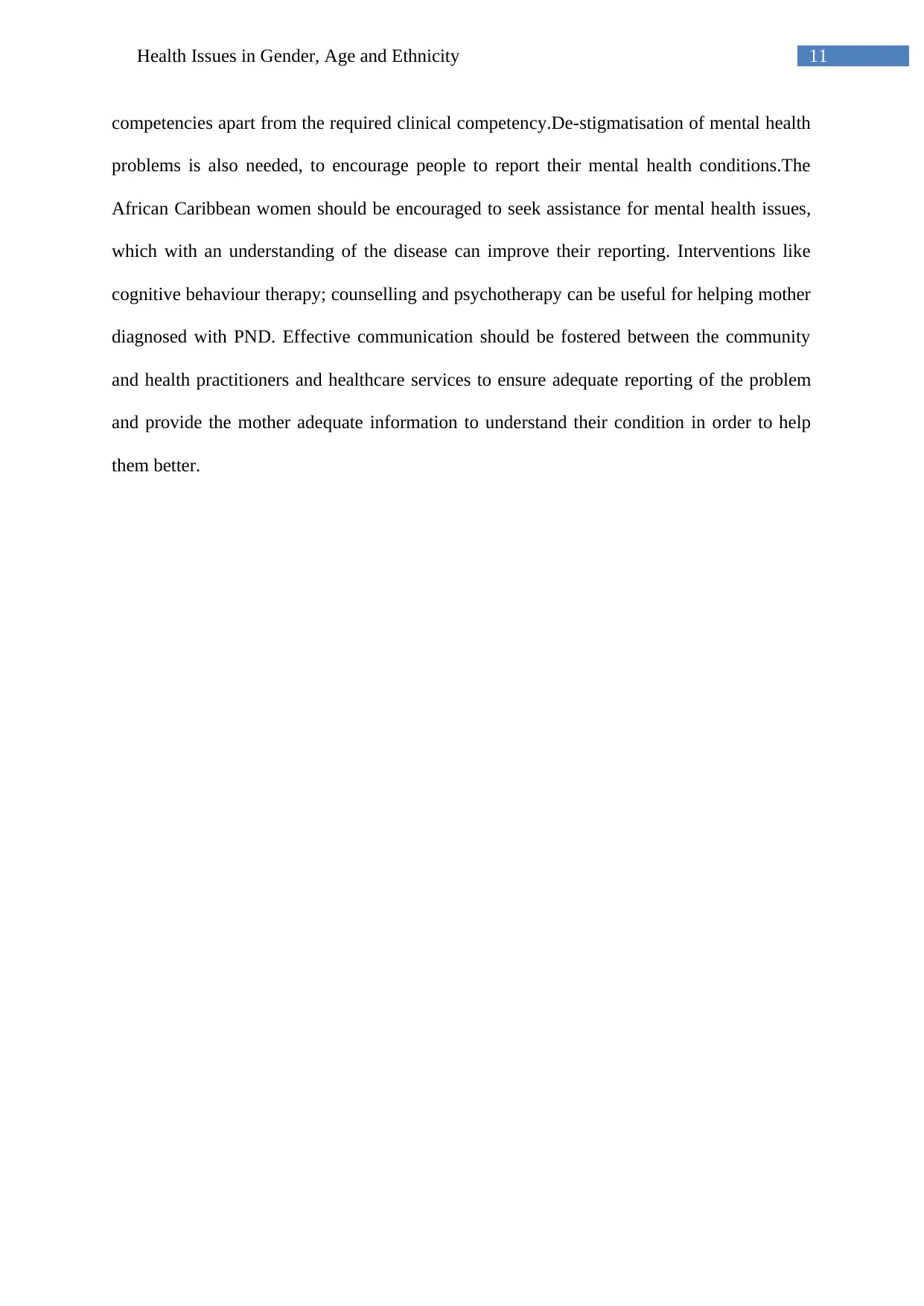
11Health Issues in Gender, Age and Ethnicity
competencies apart from the required clinical competency.De-stigmatisation of mental health
problems is also needed, to encourage people to report their mental health conditions.The
African Caribbean women should be encouraged to seek assistance for mental health issues,
which with an understanding of the disease can improve their reporting. Interventions like
cognitive behaviour therapy; counselling and psychotherapy can be useful for helping mother
diagnosed with PND. Effective communication should be fostered between the community
and health practitioners and healthcare services to ensure adequate reporting of the problem
and provide the mother adequate information to understand their condition in order to help
them better.
competencies apart from the required clinical competency.De-stigmatisation of mental health
problems is also needed, to encourage people to report their mental health conditions.The
African Caribbean women should be encouraged to seek assistance for mental health issues,
which with an understanding of the disease can improve their reporting. Interventions like
cognitive behaviour therapy; counselling and psychotherapy can be useful for helping mother
diagnosed with PND. Effective communication should be fostered between the community
and health practitioners and healthcare services to ensure adequate reporting of the problem
and provide the mother adequate information to understand their condition in order to help
them better.
⊘ This is a preview!⊘
Do you want full access?
Subscribe today to unlock all pages.

Trusted by 1+ million students worldwide
1 out of 15
Related Documents
Your All-in-One AI-Powered Toolkit for Academic Success.
+13062052269
info@desklib.com
Available 24*7 on WhatsApp / Email
![[object Object]](/_next/static/media/star-bottom.7253800d.svg)
Unlock your academic potential
Copyright © 2020–2026 A2Z Services. All Rights Reserved. Developed and managed by ZUCOL.





